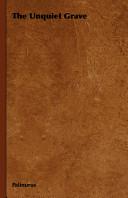Quotes from book
The Unquiet Grave

The Unquiet Grave is a literary work by Cyril Connolly written in 1944 under the pseudonym Palinurus. It comprises a collection of aphorisms, quotes, nostalgic musings and mental explorations.
“Life is a maze in which we take the wrong turning before we have learnt to walk.”
Part I: Ecce Gubernator (p. 23)
The Unquiet Grave (1944)
“Imprisoned in every fat man a thin one is wildly signalling to be let out.”
Part II: Te Palinure Petens (p. 58)
The Unquiet Grave (1944)

“The true index of a man’s character is the health of his wife.”
Part II: Te Palinure Petens (p. 64)
The Unquiet Grave (1944)
“No city should be too large for a man to walk out of in a morning.”
Part I: Ecce Gubernator (p. 35)
The Unquiet Grave (1944)
“Like water, we are truest to our nature in repose.”
Part III: La Clé des Chants (p. 91)
The Unquiet Grave (1944)
“There are many who dare not kill themselves for fear of what the neighbours will say.”
Part II: Te Palinure Petens (p. 62)
The Unquiet Grave (1944)
“Everything is a dangerous drug to me except reality, which is unendurable.”
Part I: Ecce Gubernator (p. 37)
The Unquiet Grave (1944)
“A mistake which is commonly made about neurotics is to suppose that they are interesting.”
Part II: Te Palinure Petens (p.64)
The Unquiet Grave (1944)
Context: A mistake which is commonly made about neurotics is to suppose that they are interesting. It is not interesting to be always unhappy, engrossed with oneself, malignant or ungrateful, and never quite in touch with reality. Neurotics are heartless.
Part III: La Clé des Chants (p. 98)
Variant: Truth is a river that is always splitting up into arms that reunite. Islanded between the arms, the inhabitants argue for a lifetime as to which is the main river.
As quoted in The International Thesaurus of Quotations (1970) compiled by Rhoda Thomas Tripp. This version has also appeared in earlier published sources<!-- The American journal Imago of the Association for Applied Psychoanalysis published by Johns Hopkins University Press (c. 1958?)-->, but it may be a misquotation.
The Unquiet Grave (1944)
Context: Ridiculous as may seem the dualities of conflict at a given time, it does not follow that dualism is a worthless process. The river of truth is always splitting up into arms that reunite. Islanded between them, the inhabitants argue for a lifetime as to which is the mainstream.
Part III: La Clé des Chants (p.103)
The Unquiet Grave (1944)
Context: There is no hate without fear. Hate is crystallized fear, fear's dividend, fear objectivized. We hate what we fear and so where hate is, fear will be lurking. Thus we hate what threatens our person, our liberty, our privacy, our income, our popularity, our vanity and our dreams and plans for ourselves. If we can isolate this element in what we hate we may be able to cease from hating. Analyse in this way the hatred of ideas or of the kind of people whom we have once loved and whose faces are preserved in Spirits of Anger. Hate is the consequence of fear; we fear something before we hate; a child who fears noises becomes the man who hates them.
Part III: La Clé des Chants (p.103)
The Unquiet Grave (1944)
Context: There is no hate without fear. Hate is crystallized fear, fear's dividend, fear objectivized. We hate what we fear and so where hate is, fear will be lurking. Thus we hate what threatens our person, our liberty, our privacy, our income, our popularity, our vanity and our dreams and plans for ourselves. If we can isolate this element in what we hate we may be able to cease from hating. Analyse in this way the hatred of ideas or of the kind of people whom we have once loved and whose faces are preserved in Spirits of Anger. Hate is the consequence of fear; we fear something before we hate; a child who fears noises becomes the man who hates them.
Part III: La Clé des Chants (p. 93)
The Unquiet Grave (1944)
Context: Flaubert spoke true: to succeed a great artist must have both character and fanaticism and few in this country are willing to pay the price. Our writers have either no personality and therefore no style or a false personality and therefore a bad style; they mistake prejudice for energy and accept the sensation of material well-being as a system of thought.
Part I: Ecce Gubernator (p. 20)
The Unquiet Grave (1944)
Context: A stone lies in a river; a piece of wood is jammed against it; dead leaves, drifting logs, and branches caked with mud collect; weeds settle there, and soon birds have made a nest and are feeding their young among the blossoming water plants. Then the river rises and the earth is washed away. The birds depart, the flowers wither, the branches are dislodged and drift downward; no trace is left of the floating island but a stone submerged by the water; — such is our personality.